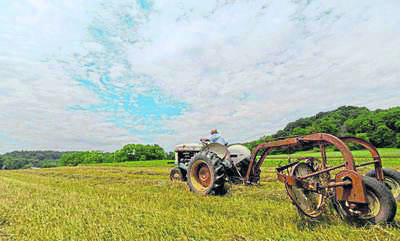Farmers in Pennsylvania and other states have good reason to be uneasy about future energy policies popularizing the political fringes. Unlike a sudden and unpredictable pandemic that threw the world into turmoil, differing paths on the use of America’s abundant fossil fuel resources could have predictably bad consequences for agriculture and beyond.
A bulwark to these consequences this November was the American voter. Overwhelmingly Americans showed themselves to be moderates and far from married to extreme agendas like the Green New Deal.
Still, environmental activists are ready to overlook practical considerations about livelihoods and America’s energy security, including significant costs and benefits. President-elect Joe Biden has proposed halting new oil and gas leasing on federal lands, just a step shy of seeking a ban on hydraulic fracturing, known as “fracking.” These policies are not without consequences.
First, consider costs. According to the Energy Information Administration, direct and indirect energy costs can account for up to half of production costs for major crops. One of the biggest costs is fertilizer; natural gas can account for between 75% and 85% of fertilizer manufacturing costs. As with any kind of production, energy costs are built into every aspect of farming. Energy keeps lighting, ventilating, heating and water pumping systems running to raise cattle and run dairy operations.
The potential ban of hydraulic fracturing on public lands is a major threat to energy savings for Pennsylvania’s farmers. Implementing a ban would have serious ramifications in the state. For example, the Allegheny National Forest, which currently supports a large portion of production in the region with 12,000 conventional wells and 11 hydraulic fracturing wells, could see its workforce jeopardized through such misguided policy.
Ending oil and gas production on federal land and a ban on fracking would in turn increase the cost of natural gas delivered to fertilizer manufacturers by an average of more than 170%, according to an American Petroleum Institute study. Conversely, think about the benefits of natural gas, especially in Pennsylvania. Since the fracking revolution began, affordable natural gas has cut the average household energy bill by more than $1,000 a year.
Farmers certainly benefit from such reduction in energy costs and production, too. Over the last 10 years, energy producers have paid some $3 billion to private agricultural operations in energy-producing states. In Pennsylvania, where the Marcellus Shale is concentrated in rural and agricultural areas, the leases have been particularly lucrative. According to the U.S. Department of Agriculture, the average annual payment to Pennsylvania farms and landowners from development of Marcellus Shale was $154,000.
The everyday consumer benefits from Pennsylvania’s natural gas and oil development as well. Shell’s Pennsylvania Petrochemicals Complex is currently under development in Beaver County with up to 6,000 construction workers involved and an expected 600 permanent employees when completed. The facility will use Marcellus Shale gas to produce polyethylene, an essential component in a diverse yet essential variety of products used at home and on the farm, ranging from pipe fittings to power cables to food packaging.
Pennsylvania’s impact fee, collected from drilling rig operators to offset the cost of road wear, is used to fund vital services such as infrastructure, fire and rescue, and libraries. Washington County and its municipalities alone expect to receive $18.1 million this year. Despite this effective impact fee, some of our state’s officials wish to levy a punitive severance tax on natural gas drillers and undermine this sector’s economic contributions. The hydraulic fracturing industry is the lifeblood of countless communities in southwestern Pennsylvania, and policies shouldn’t disrupt this success story.
Using domestic supplies of natural gas is compatible with addressing climate change. Environmental activists don’t need to explain to farmers the threat of droughts, fires or severe storms. Conservation has been a hallmark of agriculture for generations because it allows productive land to pass from one generation to the next. Natural gas produces far less carbon dioxide than another Pennsylvania energy resource — coal. Many farmers have converted acres to solar farms.
American natural gas has been a godsend for many farmers. It has brought down fuel costs considerably, helped make some farmers very prosperous and even helped reduce carbon emissions.
Balancing environmental, economic and agricultural interests starts with energy. The evidence is plentiful in the commonwealth; the Biden administration only need acknowledge it.
Carol Ann Gregg, a resident of Grove City, is a retired dairy farmer and past president of Penn’s Agri-Women and American Agri-Women.








